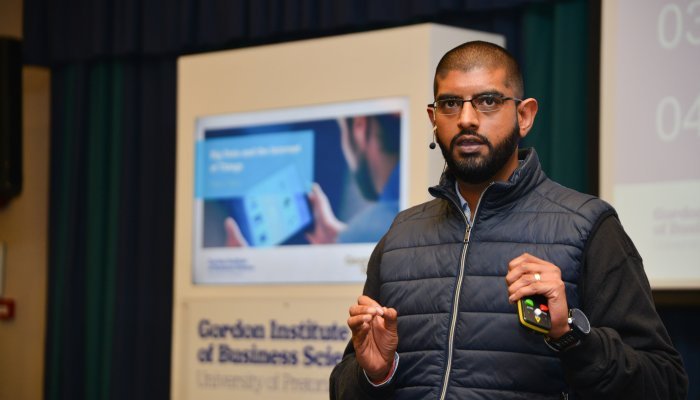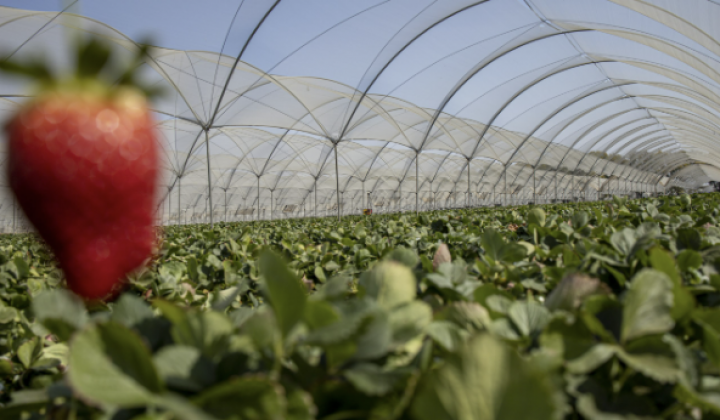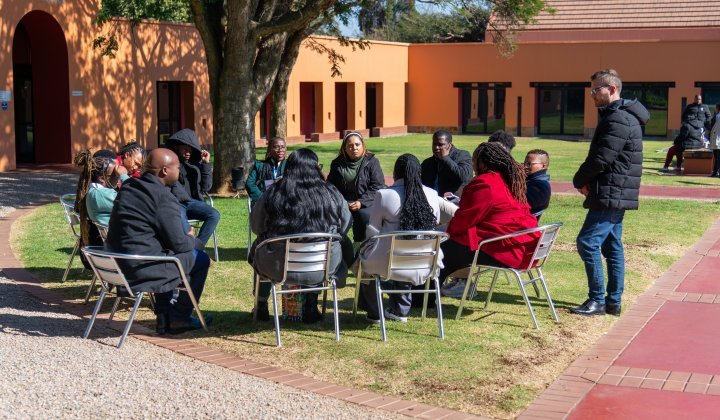As sustainability becomes a greater focus, business schools must play a key role in shaping responsible leaders. Integrating sustainability and ethics into the curriculum is no longer optional — it is essential for preparing future leaders to navigate global challenges and drive positive change.
For GIBS, responsible business education is central to how the school operates, with sustainability and ethics embedded in its core practices.
“As GIBS is a key driver of societal change, it’s crucial for our students and delegates to be well equipped to navigate a rapidly evolving landscape. Organisations, not just businesses, must adapt to challenges such as climate change, resource depletion and social inequality,” says Professor Manoj Chiba, director of the MBA programme at GIBS.
GIBS is a signatory and member of the Association to Advance Collegiate Schools of Business (AACSB), a global nonprofit organisation that connects students, educators and businesses, as well as a signatory of the United Nations Global Compact initiative known as PRME – the Principles of Responsible Management Education – and a member of the PRME Champions group.
This position urges the school to prioritise sustainability and ethics, offering best-practice frameworks to foster inclusion.
According to Prof. Chiba, both individuals and organisations, as well as national and continental landscapes, have undergone significant changes from a sustainability and ethical standpoint.
Chiba points to several reasons why integrating sustainability and ethics into the curriculum is important.
- Developing responsible leaders: Chiba says ethical decision-making is crucial in today’s business world and students must recognise how their choices affect both organisations and society.
- Encouraging a holistic approach: GIBS is committed to ensuring that its students and delegates consider the environmental, social and economic impacts and understand how these themes inform holistic decision-making in a business context.
- Attracting and retaining talent: Recognising sustainability and ethics enhances the employability of students and delegates by equipping them with the skills and tools needed to drive both personal and organisational decision-making.
- Driving innovation: Sustainability-driven innovation can lead to new business and organisational opportunities and make these businesses more sustainable while addressing some of most pressing challenges in a systematic manner.
- Fostering a global perspective: Sustainability and ethics are global issues that demand a broader perspective. Business schools that focus on these topics help students and delegates understand the interconnectedness of the global economy, the importance of ethical cross-border operations, and how businesses can address global challenges to contribute to the achievement of the Sustainable Development Goals (SDGs).
- Sustainability-focused education: Chiba explains that sustainability-focused education helps students and delegates grasp the long-term impact of their actions, encouraging solutions that promote environmental stewardship, social well-being, and economic fairness, while shaping them into responsible leaders.
To this end, GIBS has embedded sustainability and ethics throughout its core modules, ensuring that all students and delegates engage with these topics as part of their curriculum.
“We provide in-depth coverage of the specific themes within responsible management education, ensuring that sustainability is addressed both operationally and strategically, across individual, organisational, and national levels,” says Chiba.
This is accomplished through two primary programmes: the Applied Business Project and the MBA course.
- Applied Business Project (ABP): The ABP is a 12-month project that all academic education students complete as part of their programme, in addition to the core courses required for their degree or diploma. The project focuses on applying methodologically and theoretically sound principles to address a selected Sustainable Development Goal (SDG). Working in groups (syndicates), students choose an SDG to focus on throughout the year, drawing on various subjects taught in their courses to develop a solution to the associated SDG challenge.
- MBA: Responsible management education is integrated throughout all five core modules: Leadership, Business Environment, Innovation and Design, Decision Making and Strategic Implementation. The topics covered include ethics, sustainability, corporate governance, ethical decision-making, value creation, and strategy, among others.
“Embedding themes related to responsible management education — particularly ethics and sustainability — ensures that students not only grasp these concepts but also apply them effectively within their own organisations.”
Additionally, Chiba says GIBS offers a range of electives for students to choose from. Within these clusters, there are specific modules focused on sustainability and ethics, which include:
- Business in Context: Analysis of business environments, corporate governance, employee well-being and happiness, managing business risks, and creating sustainable supply chains with economic value.
- Entrepreneurship: Features modules on green entrepreneurial start-ups, impact investing, social entrepreneurship, and women in entrepreneurship.
- Finance: Offers courses on sustainable finance, emerging technologies, the future of business, as well as strategic finance, and value creation.
- Leadership: Includes modules on contextual leadership intelligence, diversity in leadership, ethics and leadership in an age of corruption, and strategic decision-making in leadership.
GIBS also offers a specialised Climate and Sustainability Leadership focus area, available to MBA students. This exclusive programme is limited to 30 participants and is deeply focused on climate leadership and sustainability.
Prof. Chiba says sustainability has been a core component of the MBA programme since its inception. From 2018, the school began more intentionally integrating these topics into core modules, electives, and focus areas. In 2023-24, the Climate Leadership and Sustainability focus area was launched and will remain a key offering aimed at students who want to pursue a career in this field. The MBA programme continues to evolve with additional focus areas in consulting, entrepreneurship, and digital.
Empowering students
Prof. Chiba emphasises the goal of equipping students to shape, drive, and enable ethical and sustainable decision-making at individual, organisational, community, national, and regional levels. “Our learning outcomes are clear — we focus on sustainability, building healthy organisations, and fostering ethical decision-makers as core elements of the skills individuals need. We empower students to think and act, providing them with the relevant tools and frameworks, while instilling a sense of ownership, responsibility, and accountability to create healthier organisations and societies.”
He explains that to help students apply these concepts from the classroom to the boardroom, the ABP (Applied Business Project) is a key example, as it focuses on practical, implementable solutions. “We take a pragmatic approach, encouraging students to think deeply about challenges while developing academically sound and actionable solutions.”
GIBS collaborates with sustainability experts, external partners, guest speakers, and the UN's SDGs. It also leverages its ethics think tank, the University of Pretoria’s sustainability faculty, and appointed faculty experts in sustainability to reinforce learning, says Dr. Hayley Pearson, GIBS’ executive director for academic education.
Successful projects
Dr. Pearson says GIBS’ programmes integrate sustainability and ethics, with successful projects such as whistleblowing initiatives and the We-Dare project (Women's Equality: Digital Access and Rights to Expression), which deal with gender-based violence (GBV). Additional examples, including those shared by Prof. Chiba, further demonstrate this integration.
As a PRME champion, GIBS is part of the PRME Chapter Africa, leading several projects to incorporate SDGs into its curriculum, research, and partnerships.
Chiba says academic success is measured through practical assignments, assessments, and achievement of learning goals.
Dr. Pearson adds that success is also tracked by monitoring student progress before and after learning interventions: “The impact of projects, particularly ABPs, is evaluated by their real-world influence.”
For example, in November 2024, three student groups presented their “From Waste to Circular Economies” project at an SDG Forum in Gauteng, engaging diverse sectors in sustainability initiatives.
Sustainable campus
The custom-built campus in Illovo in Johannesburg has committed to reducing its carbon emissions and operating in a sustainable manner.
“Our PRME membership demonstrates our commitment to cultivating responsible business practices and embedding sustainability, social responsibility, and ethics into every aspect of our business,” says Howard Fox, the managing executive for commercial at GIBS.
Fox says GIBS has included climate leadership as a core strategic objective for the school to inspire and encourage others to join in creating a sustainable future and to play a leading role in driving positive change within the industry.
In the 2022 financial year, the school took a significant step toward its sustainability goals by measuring its carbon emissions for the first time. This established a baseline for tracking progress and identifying areas to reduce its environmental impact.
During the 2023 financial year, the school conducted an energy audit to assess campus energy usage and reduce reliance on the national electricity grid. Alternative energy solutions, including natural gas and solar power, were identified.
“Solar energy emerged as the most cost-effective and environmentally friendly option for the GIBS campus. We are now working to secure funding for its installation, marking the start of our transition to more sustainable energy,” says Fox.
Through the implementation of waste hierarchy options, GIBS has achieved the following:
- 14 650.07m3 of CO2 (carbon dioxide) saved
- 2 549 010 litres of water saved
- 90 trees saved
- 68% recycled waste volume.
KEY TAKEWAYS
GIBS’ outlook on advancing sustainability and ethics in business education
Prof. Manoj Chiba says over the past five years business schools have increasingly focused on embedding innovation to address sustainability and ethical decision-making challenges.
This shift is unsurprising given the local, regional and global changes over the past 20 years.
Key shifts include integrating technology, focusing on the SDGs, embedding ethics in decision-making, moving from profit-only to more inclusive outcomes (such as the triple bottom line), shifting from competition to co-opetition, and placing society at the heart of both organisational and individual priorities.
Chiba says that in future:
- Sustainability and ethics will remain central to GIBS’ overall business strategy and the principles of responsible management education.
- The business school will continue evolving its offerings to address the most pressing challenges faced by organisations, society, and individuals, while staying contextually relevant to fostering sustainable organisations and empowering individuals as agents of change.
- GIBS will maintain a strong focus on accountability and responsibility, while innovating the impact of management education, ensuring it remain responsible across multiple dimensions.






